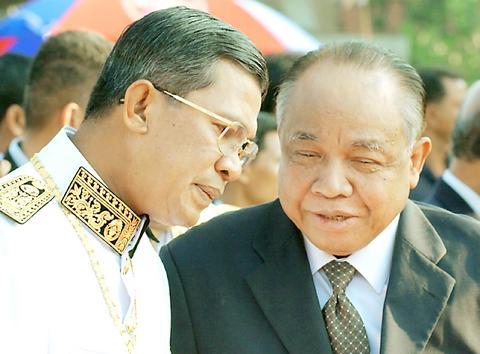Cambodia's King Norodom Sihanouk, after refusing repeatedly to sign a bill to pave the way for a new government, finally agreed yesterday to reappoint Prime Minister Hun Sen, the Information Ministry said.
In a document signed by Sihanouk yesterday and released by the ministry, the King said he had approved a request from Hun Sen's ruling Cambodian People's Party (CPP) to appoint the former Khmer Rouge for another five-year term in office.
Hun Sen has run the nation for nearly 20 years, making him one of the world's longest serving prime ministers.

PHOTO: EPA
"[I] appoint Hun Sen as the prime minister of the royal government of Cambodia," the King wrote.
"The Prime Minister has the duty to propose forming of government and seek the approval from the National Assembly."
Sihanouk also rubber-stamped another controversial bill already passed by parliament approving the simultaneous election of prime minister and National Assembly president.
Both Sihanouk and the opposition had questioned the legality of the so-called "package vote" designed to neutralize the inherent distrust and loathing that Cambodia's fractious politicians feel for each other.
The change of heart by Sihanouk, who is in North Korea waiting out a year-long post-election political stalemate, followed confusion on Tuesday in which senate president and acting head of state Chea Sim left the country abruptly "for health reasons."
In Sihanouk's absence, Chea Sim had the authority to sign laws already approved by the National Assembly and Senate.
However, the opposition said troops and police had surrounded Chea Sim's house prior to his departure in what amounted to a "coup" within the ruling party. The "package vote" bill was then signed by the deputy acting head of state.
Thai Prime Minister Thaksin Shinawatra confirmed yesterday that Chea Sim and several other prominent Cambodian politicians had entered Thailand on Tuesday.
Yesterday morning Chea Sim underwent a cardiogram at Bangkok's Bumrungrad Hospital, but was released after a brief stay, hospital officials said.
Chea Sim, president of the CPP and the senate, leads a faction within the CPP that has long been seen as a rival to Hun Sen, although the rift between senior members of the tightly-run former communist party has been kept from public view.
Opposition leader Sam Rainsy was quoted as saying the flight of Chea Sim and his political allies from Cambodia were indications of a "party coup d'etat" within the CPP.
Thailand's prime minister, who has had a stormy relationship with Cambodia's leadership, confirmed that Chea Sim was one of several key Cambodian leaders to have unexpectedly entered Thailand, but he did not name the others.
"This is Cambodia's internal affair. Thailand won't interfere," Thaksin told reporters at his party's headquarters. "We have to pray that the turmoil in Cambodia will end soon and they can form a new government. We want to see Cambodia on the road to development."
The Thai military's Chantaburi Task Force, which handles security along the Thai-Cambodian border, was reported yesterday to have stepped up security, particularly at the crossing point at Koh Kong.
An Immigration Police source said Thai officers had been instructed to allow Cambodian "VIPs" to cross into Thailand regardless of whether they carried visas.
CPP spokesman Khieu Kanharith played down talk of political instability and a rift down the middle of the former communist party, which has ruled Cambodia for the past two decades.

A fire caused by a burst gas pipe yesterday spread to several homes and sent a fireball soaring into the sky outside Malaysia’s largest city, injuring more than 100 people. The towering inferno near a gas station in Putra Heights outside Kuala Lumpur was visible for kilometers and lasted for several hours. It happened during a public holiday as Muslims, who are the majority in Malaysia, celebrate the second day of Eid al-Fitr. National oil company Petronas said the fire started at one of its gas pipelines at 8:10am and the affected pipeline was later isolated. Disaster management officials said shutting the

US Vice President J.D. Vance on Friday accused Denmark of not having done enough to protect Greenland, when he visited the strategically placed and resource-rich Danish territory coveted by US President Donald Trump. Vance made his comment during a trip to the Pituffik Space Base in northwestern Greenland, a visit viewed by Copenhagen and Nuuk as a provocation. “Our message to Denmark is very simple: You have not done a good job by the people of Greenland,” Vance told a news conference. “You have under-invested in the people of Greenland, and you have under-invested in the security architecture of this

Japan unveiled a plan on Thursday to evacuate around 120,000 residents and tourists from its southern islets near Taiwan within six days in the event of an “emergency”. The plan was put together as “the security situation surrounding our nation grows severe” and with an “emergency” in mind, the government’s crisis management office said. Exactly what that emergency might be was left unspecified in the plan but it envisages the evacuation of around 120,000 people in five Japanese islets close to Taiwan. China claims Taiwan as part of its territory and has stepped up military pressure in recent years, including

UNREST: The authorities in Turkey arrested 13 Turkish journalists in five days, deported a BBC correspondent and on Thursday arrested a reporter from Sweden Waving flags and chanting slogans, many hundreds of thousands of anti-government demonstrators on Saturday rallied in Istanbul, Turkey, in defence of democracy after the arrest of Istanbul Mayor Ekrem Imamoglu which sparked Turkey’s worst street unrest in more than a decade. Under a cloudless blue sky, vast crowds gathered in Maltepe on the Asian side of Turkey’s biggest city on the eve of the Eid al-Fitr celebration which started yesterday, marking the end of Ramadan. Ozgur Ozel, chairman of the main opposition Republican People’s Party (CHP), which organized the rally, said there were 2.2 million people in the crowd, but